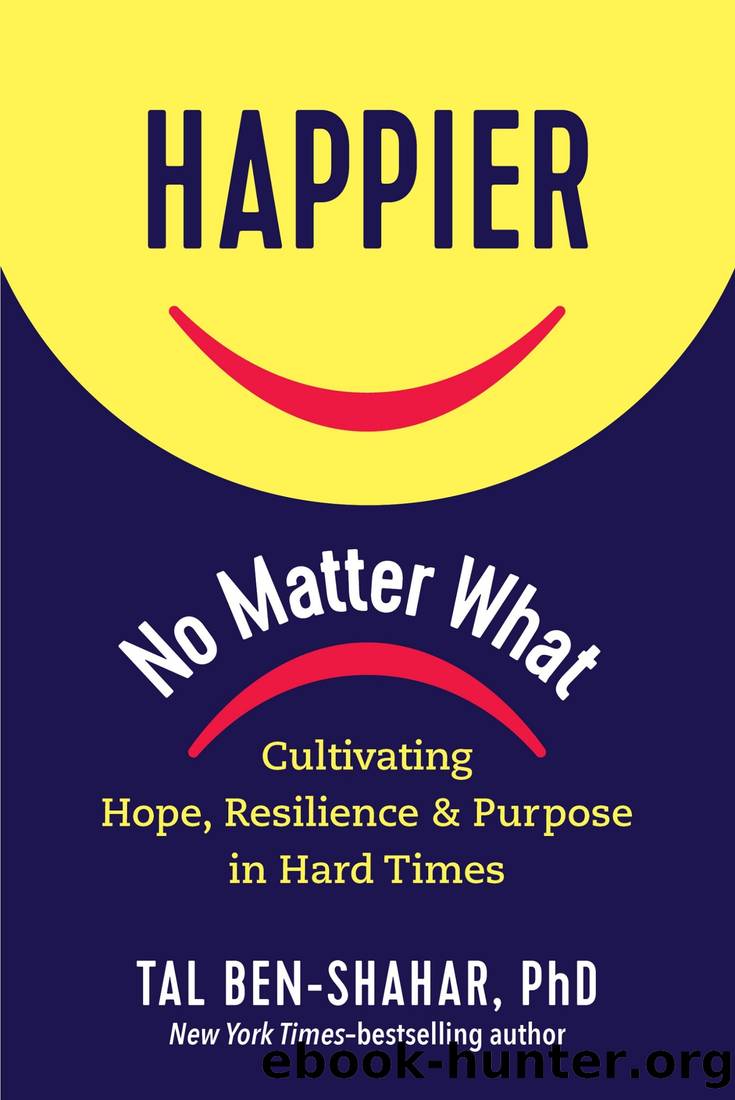Happier, No Matter What: Cultivating Hope, Resilience, and Purpose in Hard Times by Tal Ben-Shahar

Author:Tal Ben-Shahar [Ben-Shahar, Tal]
Language: eng
Format: epub
Tags: Self-Help, Personal Growth, Happiness, Psychology, Emotions, Health & Fitness, Healthy Living
ISBN: 9781615197910
Google: 7H_-DwAAQBAJ
Publisher: The Experiment
Published: 2021-05-11T23:40:11.656520+00:00
The Fear of Making a Mistake
How many of us consider ourselves to be perfectionists? Perfectionists are hypercritical of themselves, disparaging of mistakes, and terrified of failure. Nobody loves to err or fall down, but there is a difference between disliking failure and intensely fearing it. When we dislike failure, we are compelled to take precautions and work harder. Intense fear, on the other hand, is paralyzing and stops us from trying. The price that we pay for this paralysis is extremely high. When we put ourselves on the line and try, we risk failure; when we refrain from trying, we guarantee failure. Moreover, the failure that comes from trying is potentially a stepping-stone, an opportunity for learning and growing. In contrast, the failure that comes from not trying is a stumbling block, narrowing our opportunities for further progress.
In job interviews, people are often asked, âSo, tell me about your greatest weakness,â and they say, âOh, my weakness is Iâm a perfectionist.â Weâre coached to give this answer in order to signal âIâm very responsible and reliable. You can trust me to do the job well.â We think of these qualities as hidden strengths. But perfectionism comes with a dark sideâthe intense fear of failure that permeates every part of our life. This is what we need to overcome.
Perfectionism hurts us in many areas of our lives. For me, the biggest price I paid was in the context of my relationships. Because a perfectionist doesnât like to be wrong, I would often be defensive whenever my partner or a friend pointed to anything I perceived as a personal shortcoming. In arguments, I would automatically think (and sometimes say): I am not wrong! You are! Over the years, as Iâve learned to be more compassionate and more accepting of flaws and failuresâseeing myself as a human beingâIâve become more open with others.
The way through is to be more forgiving of your imperfections. Self-compassion is just as important as compassion toward others.12 When youâre more forgiving, you are more open to learning from your mistakes and can make better decisions going forward. Even though failure hurts, and even though deviating from the straight and narrow may be challenging, itâs an essential part of the process. You will find more success and happiness when you embrace failure rather than judge imperfection, forgive mistakes rather than chastise flaws.
The Growth Mindset
Another way to combat the fear of making mistakes is to develop a growth mindset.13 The growth mindset is the belief that we are capable of change. Whether with regard to our mental skill, our ability to draw, to shoot a basket, to run a business, or to be in a relationship, itâs the belief that our abilities are malleable and that we can improve. The opposite, the fixed mindset, is the belief that weâre either born with an ability or not. Weâre either smart or weâre not. Weâre either talented or ungifted. Our relationship is either absolutely great or damaged beyond repair. A fixed mindset doesnât allow for evolution.
Download
This site does not store any files on its server. We only index and link to content provided by other sites. Please contact the content providers to delete copyright contents if any and email us, we'll remove relevant links or contents immediately.
Spare by Prince Harry The Duke of Sussex(5200)
Machine Learning at Scale with H2O by Gregory Keys | David Whiting(4314)
Fairy Tale by Stephen King(3401)
Will by Will Smith(2924)
The Bullet Journal Method by Ryder Carroll(2575)
Hooked: A Dark, Contemporary Romance (Never After Series) by Emily McIntire(2559)
It Starts With Us (It Ends with Us #2) by Colleen Hoover(2370)
Rationality by Steven Pinker(2368)
Can't Hurt Me: Master Your Mind and Defy the Odds - Clean Edition by David Goggins(2344)
Friends, Lovers, and the Big Terrible Thing by Matthew Perry(2234)
The Becoming by Nora Roberts(2207)
Love on the Brain by Ali Hazelwood(2080)
A Short History of War by Jeremy Black(1851)
The Strength In Our Scars by Bianca Sparacino(1847)
HBR's 10 Must Reads 2022 by Harvard Business Review(1847)
A Game of Thrones (The Illustrated Edition) by George R. R. Martin(1751)
Leviathan Falls (The Expanse Book 9) by James S. A. Corey(1747)
515945210 by Unknown(1669)
Bewilderment by Richard Powers(1623)
